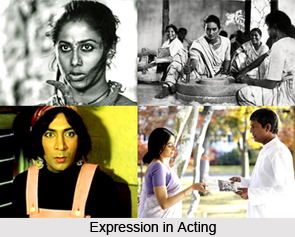 Style of Acting for Television Drama in India differs very well from the conventional stage acting in Indian theatre or Indian drama. The acting too, therefore has to be more subtle, more lifelike and more realistic than that in either theatre or films where a certain degree of histrionics and melodrama are permissible and tolerable since one is not seeing it so closely and in so intimate an environment. A very good stage actor can find it very difficult to adapt himself to a medium like television or/and would be less effective because he may be used to projecting his actions, emotions on a scale larger than life, to be able to reach the last member of his audience. He might tend to forget that in TV his viewer is always very close to him; he has to portray the character on a normal life scale for it to reach his viewers. Another point about television acting is that the action has to be broken up into scenes and episodes and the stage actor used to a continuous performance may find it difficult to maintain consistency. Yet television acting is not as fragmentary as in films where each shot is planned, designed and enacted separately. On television generally one scene on one location can at least be shot at a stretch thereby allowing the actor a comparatively greater continuity and concentration.
Style of Acting for Television Drama in India differs very well from the conventional stage acting in Indian theatre or Indian drama. The acting too, therefore has to be more subtle, more lifelike and more realistic than that in either theatre or films where a certain degree of histrionics and melodrama are permissible and tolerable since one is not seeing it so closely and in so intimate an environment. A very good stage actor can find it very difficult to adapt himself to a medium like television or/and would be less effective because he may be used to projecting his actions, emotions on a scale larger than life, to be able to reach the last member of his audience. He might tend to forget that in TV his viewer is always very close to him; he has to portray the character on a normal life scale for it to reach his viewers. Another point about television acting is that the action has to be broken up into scenes and episodes and the stage actor used to a continuous performance may find it difficult to maintain consistency. Yet television acting is not as fragmentary as in films where each shot is planned, designed and enacted separately. On television generally one scene on one location can at least be shot at a stretch thereby allowing the actor a comparatively greater continuity and concentration.
The availability and nature of television play scripts forms the most crucial point for discussion. It is important to realize that unlike any other mode of creative writing, a television play script cannot be a one-man band; here the script writer, director, actors, producer, cameraman are all equally important and it is only when they all work in co-ordination that the script acquires any meaning. In fact, results achieved in a television production are often more spectacular than what the script indicates, because it is meant essentially for visual representation. A stage play can still be a great piece of literature without its being actually performed, and there have been plays that are more effective when read than when staged. But a television play script cannot have any such independent standing; its meaning, like the films, lies in its visualization.
Now, it is about time that more attention be given to the development of television drama as a specialized field and encouraged on a large scale through workshops that would facilitate interaction between the writers, television producers, technicians and stage directors. Unless definite steps are taken in this direction the dangers of the commercial cinemas completely overpowering is very prominent. A high potential medium like television has not only to run in competition with the films but has to struggle hard to establish a distinct identity of its own.




